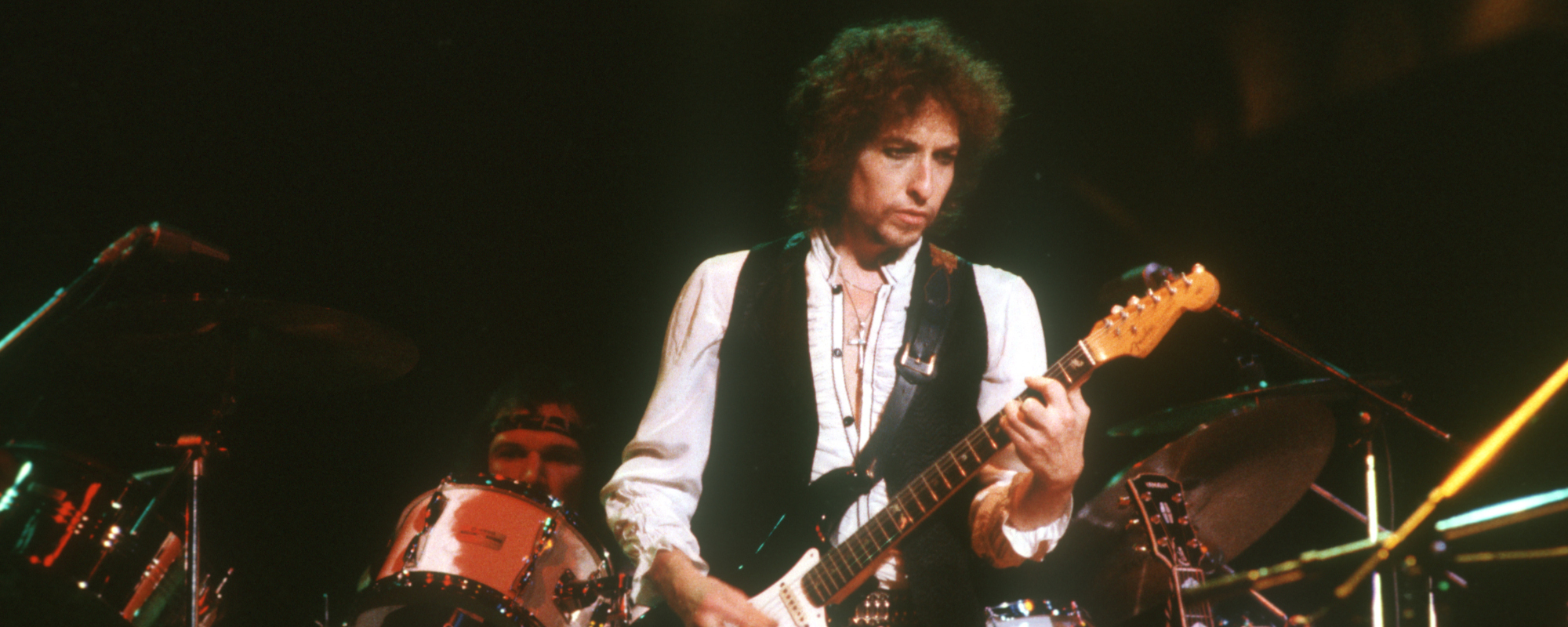“Mercurial” is an adjective that gets attached to Bob Dylan a lot, sometimes lovingly, sometimes pejoratively, and not always fairly. But it could certainly apply to the decision-making that went into his 1983 album Infidels.
Videos by American Songwriter
A few of the choices he made hampered the finished product. But then it wouldn’t be Dylan if we could predict his moves, would it? Here is the story of all that went into Infidels, as well as the tale of a few things that didn’t make it into the album but probably should have.
Singing Secular Again
Infidels was accompanied by a bit more promotional fanfare than Dylan’s previous few records when it was released in 1983. It was his first album release in 2 1/2 years, which was a longer recording hiatus than usual for him at the time. The album also marked a return to mostly secular topics after his previous three albums were focused on religious material.
His record label (Columbia Records) clearly wanted to put that divisive era behind them, so they threw their marketing weight behind this “comeback” album. They even convinced Dylan to do videos to promote the songs, which he reluctantly did for the tracks “Jokerman,” “Sweetheart Like You,” and “License to Kill.”
Dylan also sought to be a commercial force again, which is, in part, why he chose to work again with Mark Knopfler, who had delivered his signature guitar licks to Bob’s first, and most successful, “born again” album Slow Train Coming. In addition, Dylan hired former Rolling Stones guitarist Mick Taylor to join Knopfler, who also co-produced the album, on guitar. Bassist Robbie Shakespeare and drummer Sly Dunbar brought shimmy to the rhythms, while Heartbreaker Benmont Tench played keyboards.
To top it off, Dylan came armed with a strong set of songs, good enough to earn Infidels classic status. That might have happened had Dylan not lost his patience. For one, he didn’t wait for Knopfler to return from his touring commitments to mix the album, and then made some questionable choices in that process.
More damaging by far was Dylan’s song selection. Feeling he hadn’t recorded them quite to his liking, he omitted “Foot of Pride” and “Blind Willie McTell” from the finished album. When fans heard these songs on the first Bootleg Series collection years later, they were astonished at their quality, especially “Blind Willie McTell,” which is regarded as one of the finest songs of his career.
Revisiting Infidels
Put those two songs on “Infidels” and it’s in the running for Top 10 all-time in Dylan’s catalog. Without them, the collection lacks some bite and a centerpiece song, although “Jokerman,” with its reggae-ish bent and marvelously mysterious lyrics, certainly does its part.
“I and I” also stands out as one of those Dylan songs that dares you to parse through the allusions and references and try to get on the songwriter’s wavelength. Infidels also finds Dylan getting back to love songs for the first time in years, and “Sweetheart Like You” and “Don’t Fall Apart on Me Tonight” tackle the topic with Dylan’s typical idiosyncratic insight.
In terms of hidden gems, “License to Kill” finds Dylan’s writing at its most incisive. Agree or disagree with his points about technology leading to ruination, but it’s impossible to deny how eloquently he defends his views. The album only bogs down when Dylan gets too caught up in current events on “Union Sundown” and “Neighborhood Bully,” arguing on topics that might be too complex for even him to tackle in a four- or five-minute song.
Take those two out, and drop in “Foot of Pride” and “Blind Willie McTell,” and Infidels is a different beast. As is, it’s at least a focused return to secular songwriting and one of his sturdiest albums in what turned out to be an up-and-down Dylan decade.
When you purchase through links on our site, we may earn an affiliate commission.
Photo by THIERRY ORBAN/Sygma via Getty Images













Leave a Reply
Only members can comment. Become a member. Already a member? Log in.